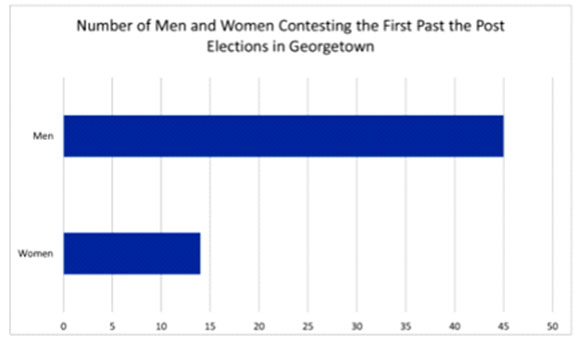When Georgetown residents go to the polls next week to vote for city councillors, only 20% of the candidates they can directly elect will be women.
This is despite the fact that reforms of the local government laws now allow for individual candidates to contest as part of a first-past-the-post (FPTP) system.
Of the 69 candidates contesting for the 15 FPTP seats in Georgetown, 14 or only 20% are women.
Of that number, three are contesting under the APNU+AFC banner, one under A Guyana Nation Building Corps (GNBC), four under the PPP/C banner, three under Team Benschop for Mayor (TBM), and three as independent candidates.

Of these groups, only GNBC has an equal number of male and female candidates. Of its 30 listed proportional representation reps, 15 are women.
Team Benschop can claim an almost 40:60 ratio of female to male candidates, with 12 of its 28 candidates being women. APNU+AFC has a similar ratio with 13 of its 30 candidates being women. The PPP’s nine female candidates account for 36% of its representatives and Team Legacy’s nine female candidates account for 35% of its representatives. YLG’s seven female candidates, accounting for 27% of its numbers, give it the lowest representation.
Still, there is very little guarantee, however, that any or all of these women will be taking up seats on the city council. Their selection to take up one of the seats the group may win depends solely on the representative of the list.
For example, if one group wins a third of the valid votes cast in the municipality, that group has the choice of selecting any five candidates to fill the five seats represented by that ratio.
One of these women is Dr. Dawn Stewart of the Guyana Nation Building Corps, who told Stabroek News on Monday evening that she believes her candidacy is enough to show women that it is possible for them to be in a position of political power.
“Even if I’m not selected to take up a seat, at least they know they have a chance and the ability to run in the next elections,” she said. According to Stewart she gave up the chance to contest for a first-past-the-post seat to a young man.
While the selection of women on the PR lists are dependent on the representative of their list, those who have chosen to contest in the first-past-the-post system have taken the bull by the horns and gone directly to the citizens for their support.
Asked why she believes so few women have taken the opportunity to be part of this process, Stewart cites a lack of education and adequate supportive mechanisms to ensure their inclusion.
“Women are afraid and can’t fight patriarchal stereotypes.
We know that women have leadership skills and do well in communities and organisations but they are intimidated by that structure which still tells them that they belong in the home. Further, there is very little support system for them; they can’t afford childcare and are often working outside the home as well. These two activities limit the amount of time they have available to participate in these processes,” she said.
Patricia Chase-Green, who is contesting in the first-past-the-post system, while disappointed that more women did not come forward to participate in the elections, is confident that the new council will see a more than adequate representation of women. She notes that she is willing to be that voice for women and their concerns on the council until such time as more women step forward and parity is achieved.
During last Saturday’s historic Georgetown Debate at the Theatre Guild, it was noted that none of the groups fielded a woman candidate to participate.
Yesterday, the world celebrated International Women’s Day under the theme “Planet 50-50 by 2030: Step It Up for Gender Equality,” which seeks to highlight their continued underrepresentation in leadership roles. In Guyana, women make up more than 50% of the population.





